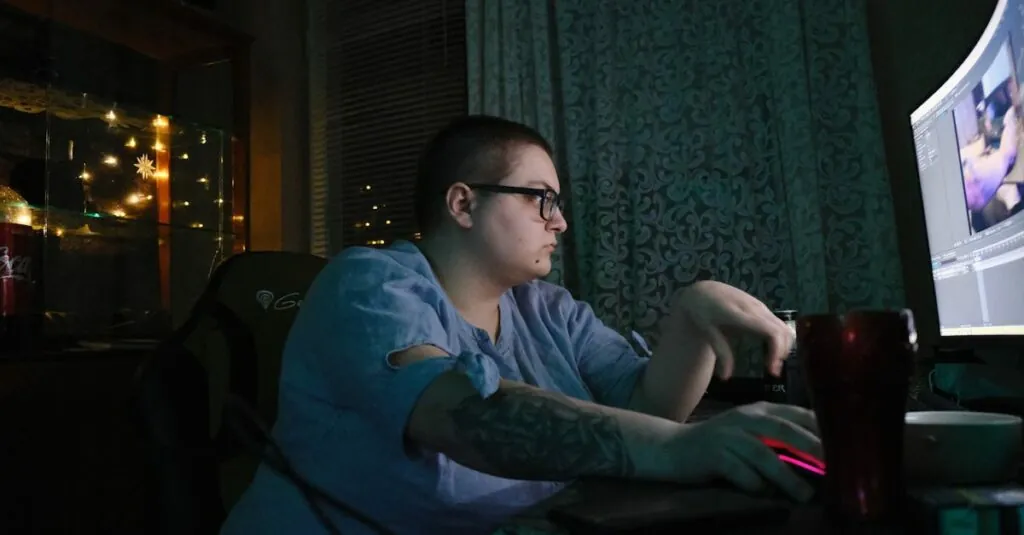In a world where 9-to-5 jobs feel like a never-ending boss battle, the rise of freelancer video games has become the ultimate power-up for aspiring digital warriors. Imagine crafting your own schedule while dodging the mundane tasks of traditional employment. These games not only offer a fun escape but also provide a sneak peek into the chaotic yet thrilling life of a freelancer.
Table of Contents
ToggleOverview of Freelancer Video Game
Freelancer video games immerse players in a virtual world that reflects the freelancer lifestyle. These games showcase the thrill of becoming an independent worker, balancing various tasks and projects. Players engage in diverse activities, such as managing budgets, meeting deadlines, and navigating client relationships.
In these games, character customization allows players to tailor their avatars, enhancing the immersive experience. Different skills and abilities unlock unique missions, providing varied gameplay options. Story-driven elements plot character journeys, often filled with challenges that mirror real-life freelance hurdles.
The competitiveness in freelancer video games fosters a spirit of entrepreneurship. Players strategize and compete with others, refining their problem-solving and time management skills. This mirrors the unpredictability of freelance work, highlighting both rewards and risks.
To enhance realism, game developers incorporate feedback systems. Players receive ratings based on performance, reflecting how client satisfaction affects real freelance careers. Game environments also mimic actual industries, offering insights into trends and market demands.
Freelancer video games serve as both an engaging pastime and a practical exploration of freelancing. They offer fun while educating players about the intricacies of independent work. As such, these games continue to rise in popularity, appealing to those seeking a break from routine, offering a taste of entrepreneurial freedom.
Gameplay Mechanics
Freelancer video games offer unique gameplay mechanics that immerse players in the freelance world. Engaging with various tasks closely simulates the ups and downs of independent work.
Exploration and Trading
Exploration in freelancer video games allows players to traverse diverse environments. Players encounter different clients and market demands, facilitating resource trading and project opportunities. Trading mechanics offer players the chance to negotiate terms and build relationships with clients. Successfully navigating these exchanges enhances player reputation and income, mirroring real-life freelancing dynamics. Unique items and resources can also be discovered, providing further avenues for growth and development.
Combat System
Combat systems often exist in freelancer video games to introduce challenges and obstacles. Players may face competitive rivals or engage in conflicts with challenging clients, requiring strategic thinking and quick decision-making. Skillful character customization enables a tailored combat experience, enhancing engagement. Mastering the combat mechanics rewards players with experience points, unlocking advanced skills and missions. This aspect underscores the unpredictable nature of freelancing, demanding adaptability and resilience in achieving professional success.
Graphics and Design
Graphics and design play a vital role in freelancer video games, enhancing immersion and engagement. These elements significantly influence a player’s overall experience.
Visual Aesthetics
Visual aesthetics in freelancer video games capture the essence of freelance life. Colorful graphics create an inviting atmosphere, while detailed environments reflect various industries. Art styles vary, ranging from realistic to stylized, catering to diverse player preferences. Character models are uniquely designed, allowing players to express individuality in their avatars. Animation quality impacts gameplay flow, making interactions feel dynamic and lifelike. Attention to detail in backgrounds, props, and textures elevates realism, enhancing the immersive experience.
User Interface
User interface design affects usability in freelancer video games. Clear menus streamline navigation, ensuring players can access tools and features without frustration. Iconography should be intuitive, helping players quickly understand their options. Feedback mechanisms display real-time updates on tasks and performance, mimicking freelance project management. Consistent color schemes and fonts improve readability, contributing to a cohesive visual experience. Responsive controls enable smooth gameplay interactions, crucial for task completion and success in various missions. Overall, a well-designed user interface enhances player satisfaction and engagement.
Storyline and Characters
Freelancer video games often feature engaging storylines that reflect the intricacies of independent work. Players navigate challenges and triumphs, exploring themes of self-reliance and creativity.
Narrative Depth
Narrative depth enhances player immersion. Players encounter diverse scenarios, from tight deadlines to challenging client relationships. Each mission unfolds unique twists, often mirroring real-world freelance dilemmas. Complex plots invite exploration of teamwork, rivalry, and personal growth. Through engaging dialogues and unexpected plot developments, gamers gain insights into the freelance lifestyle. Additionally, players can influence story outcomes, allowing for multiple endings or paths based on decisions made. This dynamic storytelling adds realism, making gameplay a reflection of true freelancing experiences.
Character Development
Character development plays a pivotal role in freelancer video games. Gamers create customizable avatars, choosing traits that reflect their personality and work style. As they progress, characters gain new skills and experience points that shape their paths. Players witness their avatars evolve, illustrating the journey of growth and adaptation. Supporting characters often present unique challenges and opportunities, providing depth to interactions. Relationships with clients and collaborators require effective communication and problem-solving, enhancing the overall gameplay experience. Engaging character arcs promote emotional investment, making players more connected to the story and its outcome.
Community and Multiplayer Aspects
Freelancer video games cultivate engaging communities where players connect, share experiences, and collaborate. Players often form teams, working together to tackle complex projects that mirror real-world freelancing collaborations. Many titles include chat functionalities, allowing real-time communication for strategic planning and support.
Competitive multiplayer modes enhance the experience by offering challenges that test skills against others. Players can participate in leaderboards, tracking their progress in freelance missions and earning recognition for their achievements. Such competitive elements foster motivation, leading to skill improvement and greater in-game success.
Diverse community events also enrich the multiplayer experience. Game developers frequently host contests or seasonal events where players can showcase their talents and creativity. These events create opportunities for players to earn exclusive rewards, enhancing engagement and community spirit.
Additionally, forums and social media groups support discussion around gameplay, strategies, and tips. Players share advice on handling difficult clients or managing tight deadlines, creating a culture of learning. The collaborative environment accelerates skill development, allowing players to navigate challenges adeptly.
Some games incorporate guilds or clans, strengthening community ties. These groups often provide players with support systems, promoting camaraderie. Guild activities, including hosting workshops or special missions, enhance interaction among members and enrich the overall game experience.
Overall, the community and multiplayer aspects of freelancer video games play a vital role in creating an immersive environment. By fostering collaboration, competition, and support, these aspects mirror the interconnected nature of real-life freelancing, providing both entertainment and valuable life lessons.
Freelancer video games offer a unique blend of entertainment and insight into the world of independent work. They allow players to experience the challenges and rewards of freelancing in a dynamic virtual environment. By navigating client relationships and managing projects, players gain valuable skills that mirror real-life freelancing.
The engaging narratives and character development elements further enhance the immersive experience. As players connect with communities and collaborate on projects, they not only enjoy the game but also foster a sense of camaraderie that reflects the freelance spirit.
Ultimately, these games serve as a fun and educational tool for anyone curious about the freelance lifestyle, making them a popular choice for gamers and aspiring freelancers alike.








